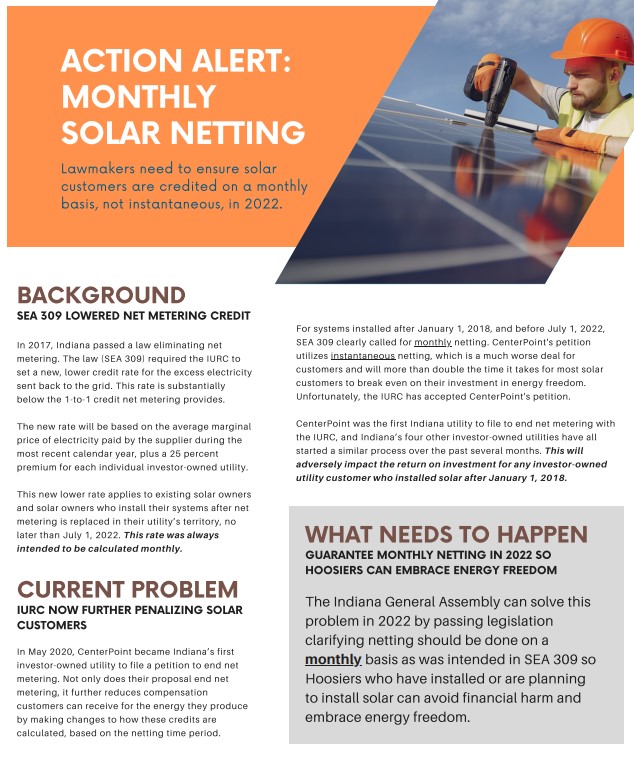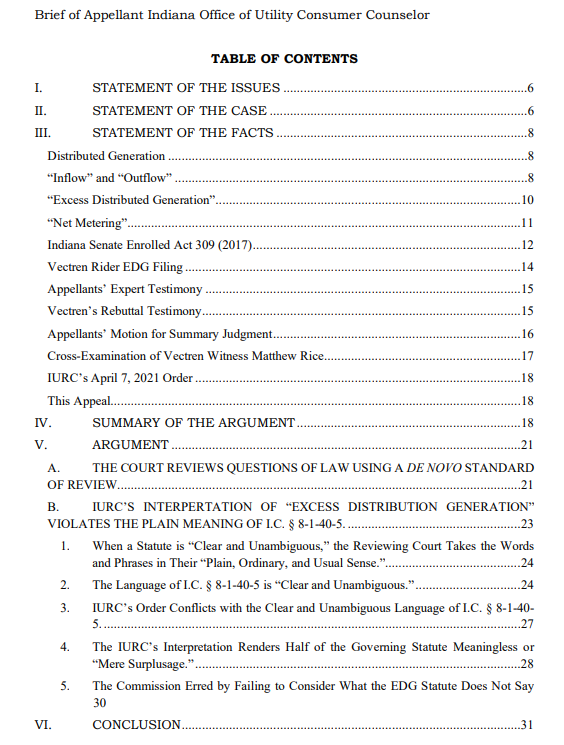Here are a few selected excerpts from IndianaDG's legal brief filed 11/23/2021 with the IURC. I strongly urge that you read this document in its entirety.
Indiana Distributed Energy Alliance (“IndianaDG”), by counsel, submits this brief in support of the proposed order filed by IndianaDG recommending that the Indiana Utility Regulatory Commission (“Commission”) deny the proposal by Indianapolis Power & Light Company d/b/a/ AES Indiana (“Petitioner” or “AES”) for an Excess Distributed Generation Rider, as the proposal does not comply with the statutory requirements of Ind. Code ch. 8-1-40 et seq. AES proposes a no netting, or instantaneous netting, EDG methodology without calling it such. It’s no netting proposal is unlawful and poses a very serious threat to the ability of Hoosiers to install distributed generation (“DG”), and to creation of the broad operational, financial, social and economic development benefits therefrom. If adopted, instantaneous netting would cause serious economic damage to the Indiana businesses that install distributed solar, forcing them to move their business activities and employment to neighboring states that have more reasonable DG rules. Ludwig, p. 5-8. Severely limiting or driving solar business out of Indiana will deprive the State of an economic development engine that creates local jobs, creates state and local tax revenues, expands valuable clean energy deployment, and provides direct benefits to all consumers. Id.
Neither the legislative history nor the plain language of SEA 309, now Ind. Code. ch. 8-1-40 (“DG Statute”) require, promote or invite a change in EDG measurement from normal monthly netting to financially disastrous no netting. Even if such a novel instantaneous netting proposal were discretionarily lawful, to show it is just and reasonable it would have needed to be robustly and transparently supported and justified by the utility to be shown fair to DG and other customers, such as through a class cost of service study using load research data on the utility’s existing DG customers or a DG cost-benefit analysis. That has not been done here.
AES’s no netting proposal does not comply with the plain meaning of the statutory definition of EDG as the difference between (1) electricity supplied to a customer, and (2) electricity supplied back to the electricity supplier by the customer. In reality AES’s proposal only measures the DG customer outflow kWh. AES’s proposed tariff fails to properly apply Section 5 by using components not stated in the statute, and not following the plain language of the statute by not defining and measuring EDG as the difference between exports and imports. It also fails to give any effect to the plain meaning of Ind. Code § 8-1-40-21(a) that continues the provisions of the Net Metering Rule 170 IAC 4- 2.2-7 for net metering and EDG customers. AES is inconsistent with the definition of EDG under Section 5 and its treatment under Section 21 of the DG statute. AES and other Indiana electric utilities appear delighted to own and incorporate solar and wind generation into their operations as shown by all their IURC Petitions seeking rate making recognition and approval to do so. But they use every possible excuse and the harshest customer financial barrier – instantaneous no netting – to stifle customer owned DG, despite its modest size and the diverse benefits it offers. Hoosiers who are interested in installing solar now and in the future and the businesses that serve them are now left to fight for the survival of future Indiana solar DG. Thankfully the facts in this Cause do not warrant, and the DG Statute does not allow, approving instantaneous netting in AES’s service area.
...
It is one thing to have a monopoly service area for retail sales of electricity. But it’s completely unreasonable in effort and in result to then seek regulatory treatments that serve to financially prevent customers from using sunshine to illuminate, cool, heat, and power their homes and buildings. Electricity from sunshine is not for the electric utility to financially monopolize. The legislature did not impose the crushing blow of instantaneous netting upon DG It chose not change the measurement method and the Commission, as a creature of statute, should not support AES effort to impose a new method here. Utilities like AES have injected their instantaneous netting proposals into EDG cases that SEA 309 makes clear are expressly intended to approve a new EDG rate, not a novel netting methodology upending an entire industry and driving them out of the state. Severely restricting the value of customers’ monthly solar generation exports through instantaneous netting stifles customer interest in DG and pushes solar installation businesses to cease their operations in Indiana. That moves the utility directly toward monopolizing the installation of solar energy in its service area. It is also contrary to the substantial benefits that would accrue to all ratepayers under increasing adoption of solar DG in Indiana, as found by the Lawrence Berkey National Laboratory in its report requested by the Commission. Inskeep, pp. 60, 63.
------------------
1 Even netting on a daily basis would preserve a substantial portion of the benefits of netting. Inskeep, pp. 67-73.
...
There is no sound basis in the record of this case for concern that monthly netting will cause harmful intraclass subsidization between DG and non-DG customers. AES has admitted “that it has not separately identified the cost of service for the DG subset of customers within their respective larger retail customer class,” and so therefore it has not actually analyzed whether there is any cross-subsidy—in either direction—that would provide reason to deviate from the longstanding monthly netting policy in place. (AES Indiana Response to IndianaDG Data Request 2-1, Stipulation of Fact 2.) In fact, AES has not presented any meaningful analysis, let alone of cost of service study, in this case on the impacts of its DG customers or of its EDG tariff proposal.
Again, here is the testimony filed by IndianaDG in this case.
Also see







